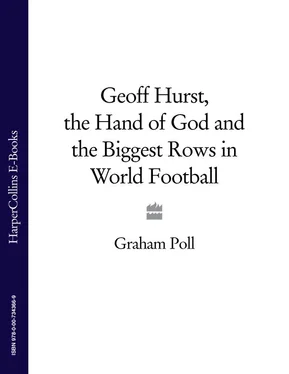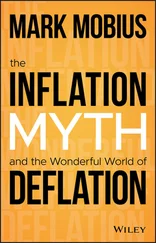It was an extreme example—so extreme that, if repeated in a World Cup Final, I bet FIFA would go against their own rules and get a message to the ref to stop the goal being awarded. However, the clear lesson from Reading’s ‘phantom goal’ is that errors do happen and, without video technology, they always will. In a less extreme case—for instance, when a ball bounces almost completely over the goal-line in the goal—it is very, very possible for the assistant and the ref to award a goal wrongly, even in a World Cup Final.
Of course, there would be one big difference if something similar to 1966 happened now—the poor referee will not be like Gottfried Dienst, who was allowed to continue the match without a word of protest and left the stadium unperturbed to get on with his life. Now, as soon as the incident happened, instant replays would be shown in the media areas of the stadium and all around the world. As two great mates of mine, top referees Urs Meier and Anders Frisk, learned to their cost, the reaction to controversial incidents is now extreme. I shall return to them later in this book, because they were very badly treated by ‘fans’ from England.
For now, though, I want to underline this conclusion from our consideration of the 1966 goal: something very similar could happen again. All these years have passed, so much has been improved, yet it could happen again. It could happen in 2010. I find that frightening. And next time, it could be England on the wrong end of a wrong decision.
QUALIFICATION TOURNAMENT:African nations boycotted the tournament because FIFA had stipulated that the continent’s top team should play off against the winners from Asia or Oceana for a place in the finals. The 70 teams that did contest the qualifying tournament were a record. England were given a place in the finals as hosts. None of the other home nations qualified. Germany had been divided into two separate countries after the Second World War. West Germany were among ten European teams in the finals.
FINALS:11-30 July. The sixteen teams were divided into four groups of four. The top two from each team progressed to the quarterfinals.
HOSTS:England
MASCOT:World Cup Willie (the first World Cup mascot: a lion on his hind legs, wearing a union flag shirt)
FINAL:England 4, West Germany 2 (after extra-time)
MATCHES PLAYED:32
GOALS SCORED:89
ATTENDANCE:1,635,000
TOP SCORER:Eusebio (Portugal, 9 goals)
HOME NATIONS:England played all their matches at Wembley, which gave them a huge advantage. They started slowly, with a goalless game against Uruguay, and only scored four goals in their group matches. Significantly, they did not concede a goal until the semi-final, in which they beat Portugal. The story of the Final is told in this chapter.
Down the years since 1966 there have been many, many other controversies about whether the ball entered the goal. One of the most contentious was when Luis Garcia scored for Liverpool against Chelsea in the European Champions League semi-final on 3 May 2005. Did his shot cross the line before Chelsea’s William Gallas hooked it away? The match officials said ‘Yes’. José Mourinho, who was Chelsea’s manager, remains adamant to this day that it was ‘a ghost goal, a goal from the moon’.
I’ve got some history with Senhor Mourinho, but I’ll try to be impartial—as I can assure you and him I always was when I refereed teams he managed. The ref that night at Anfield was Lubos Michel from Slovakia, whom I know well. We were at two World Cups together. He was one of the top men in refereeing and by 2005 he had already been on the international list for a dozen years—and he had refereed a big match involving Mourinho two years earlier. That was the UEFA Cup Final between Mourinho’s Porto and Celtic on 21 May 2003. Martin O’Neill, the Celtic manager at the time, criticized Michel for sending off one of his players and allowing Porto to get away with some time-wasting. Funnily enough, Mourinho had no complaints.
Funnily enough as well, in 2005 he did not comment on what happened immediately before the ‘ghost goal’. Liverpool’s Milan Baros clipped the ball up over the advancing goalkeeper, Petr Cech, but was flattened by him. Garcia nipped in and knocked the ball goal-wards. The assistant referee, Michel’s compatriot Roman Slysko, was well positioned and instantly signalled a goal. Bearing in mind what I’ve told you about referees’ instructions to assistants, we can be sure that Slysko was certain the ball had crossed the line.
But Michel still had to make the decision. I’ve asked him about it. He told me, ‘Either it was a goal—and my assistant was sure it was—or I had to give a penalty against Petr Cech and send him off for denying a clear goal-scoring opportunity. I believe Chelsea would have preferred the goal to count rather than face a penalty and have ten men for the rest of the game.’
So, yes, I’d say justice was done. UEFA, the game’s governing body in Europe, obviously had no problem with either Michel or Slysko. They were appointed together for the 2008 Champions League Final in Moscow. Mourinho had been sacked by then but Chelsea lost that one as well.
You remember that it was William Gallas who hooked away Garcia’s shot. Well, Gallas was the beneficiary of a goal-line decision on 3 November 2007 when he was playing for Arsenal against Manchester United at the Emirates. United were leading 2-1 but, in added time, Gallas shot and United goalkeeper Edwin van der Sar pawed the ball away. Assistant referee Darren Cann was perfectly placed to make a decision and brave enough to do so. He signalled that the ball had crossed the line. He was correct.
It takes courage to make a big decision at a crucial moment, and a very skilled person to get a difficult decision right in those circumstances. I’d cite Cann’s call as the best of the 2007/08 season. To me, that is a perfect illustration of how hard the job of an assistant is.
But, no, they don’t always get it right. And that brings us to the incident involving Pedro Mendes of Spurs and Roy Carroll of Manchester United at Old Trafford on 4 January 2005. Mendes definitely scored a goal for Spurs. But he shot from way out and assistant referee Rob Lewis was 20 yards or so upfield. He could not see when the ball entered the goal. Nor could referee Mark Clattenburg. So, when Carroll clawed the ball away from more than a yard behind the line, everyone played on. Spurs reckon the officials’ mistake cost the London club a place in the Champions League because it robbed them of a win and two points. That is how many they finished behind fourth-placed Arsenal in the table. Mind you, they did drop 51 points in other matches!
Similarly, can Bolton really claim to have been relegated in the 1997/98 Premiership season because of one goal-line decision? Of course not. They only collected 40 points all season. Yet you can understand why they were aggrieved when Everton survived on goal-difference, because earlier in the season, at the Reebok stadium, Gerry Taggart had thought he’d scored for Bolton to beat Everton but referee Stephen Lodge could not see whether the ball had crossed the line and so did not award a goal. That match was on 1 September 1997.
A little under five months earlier, an event occurred which the people of Chesterfield believe was the biggest miscarriage of justice in FA Cup history. On 13 April 1997, Chesterfield, from the third tier of English football, were 2-1 up in the semi-final against Middlesbrough, from the top division. Chesterfield’s Jonathan Howard crashed a shot against the bar and believed that it bounced down over the line. The assistant, Alan Sheffield, thought so as well and signalled a goal. I have explained that referees do not want assistants to ‘see’ things that have not happened, but in this example, the assistant was correct. TV replays showed that the ball was, indeed, over the line. The assistant had the courage of his convictions, signalled and ran back towards the halfway line. Yet referee David Elleray did not award the goal. Middlesbrough fans claimed that Elleray had already blown for a foul against a Middlesbrough player. Elleray denied that. He said he was merely unsighted and so could not award the goal. Sheffield was an international assistant, but Elleray did not take his word for what had happened. The other assistant was Phil Sharp. I asked both him and Sheffield about the incident but they told me they had been instructed by Elleray not to discuss it.
Читать дальше












